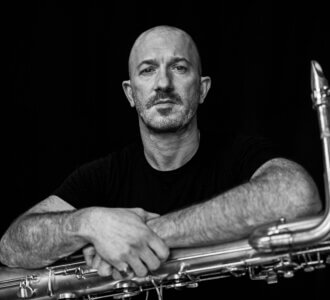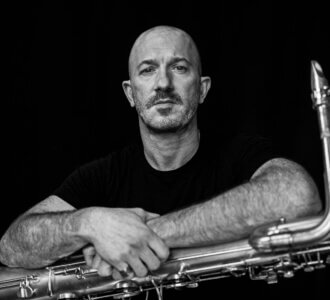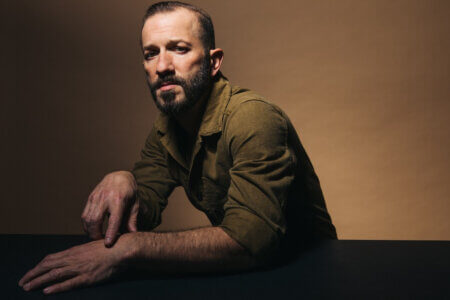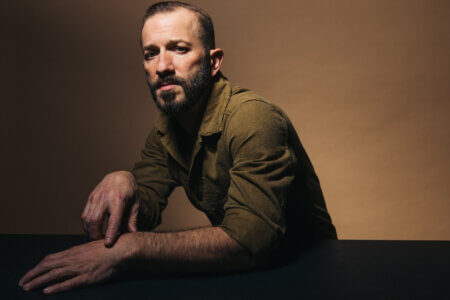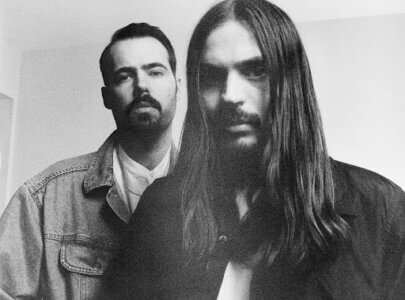Colin Stetson stays truly inspired
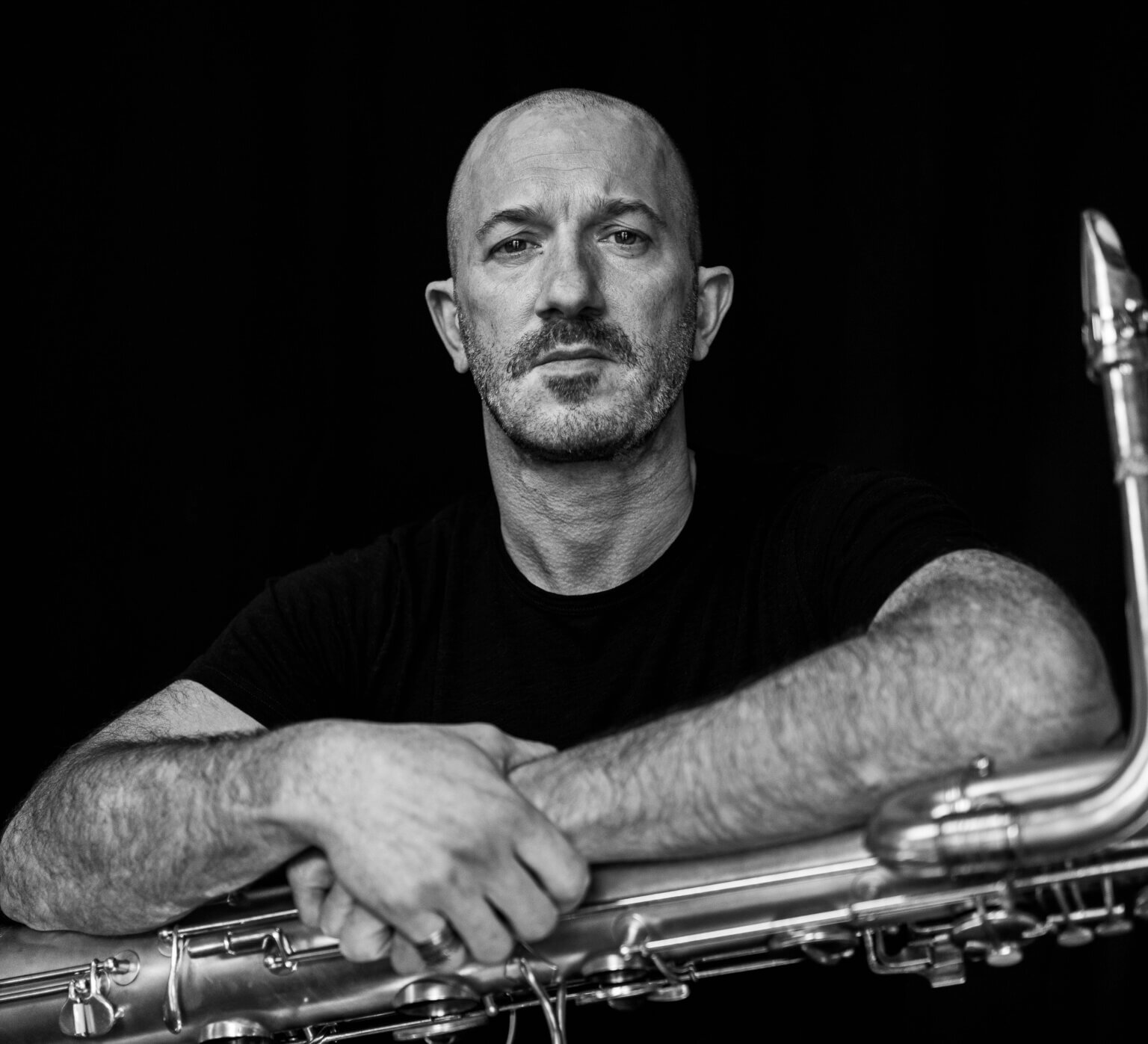
Colin Stetson is a Canadian-American saxophonist, multireedist, and composer based in Montreal. Stetson has performed and recorded with dozens of artists, including Tom Waits, Arcade Fire, TV on the Radio, Feist, Bon Iver. With the upcoming release of his new record, The Love It Took to Leave You arriving on September 13 via Envision/invada, Stetson talks to Northern Transmissions about the preparation that went into these recordings as well as integrating some of his early influences on his incredible new record.
NT: The performances on the new record, The Love It Took to Leave You, are incredibly visceral and intense. Was there any sort of preparation you had to do to get in the frame of mind to record these songs?
CS: Yeah because we were doing it on location this recording all had to be done in a week, all the songs had to be recorded and filmed so there were a lot of moving parts with the logistics of the recording, getting all of the people together and having my production manager Marco to wrangle an enormous amount of gear, We had to bring in the PA as well as the video equipment and screen and setting up the entire space with the speakers the way that we wanted. So yes, there was a lot of preparation and setup as far as the logistics go, and for me, it was months really of preparation and especially that last month getting ready, all I really did was play that music all day to make sure that I was in the shape that could handle playing every day all day for 8-10 hours a day tracking the record.
NT: Yeah, totally, and there are some big moments on this record. One of my favourite tracks is Strike Your Forge and Grin. It becomes a very meditative listening experience over the course of its run time for me personally. Still, I’m curious to know what the experience has been like performing that song and if there is any transcendental or meditative place you go to while playing or if you are thinking of all the aspects of playing such a big song.
CS: Anytime anybody sees me play a piece of music on stage they can safely assume that I have played that piece of music hundreds if not thousands of times because I’ve played at home every day for however many years and the reason I rehearse like that and practice like that is not just because physically I want to be able to play it on stage that’s part of it but it’s also wanting to know them fully through and through so these pieces are things I know and inhabit entirely and so no I should never be thinking about what’s next in my hand or thinking about what my hands are doing. I think we throw around words like meditative or transcendental, like there other than just regular life. Like you get into a space and you are above and your more. I don’t really think about things like that. Meditation is the conscious observation in real time of the present moment, so yes, it is definitely akin or synonymous with meditation because my goal is to be fully present in the making of the music.
NT: Wow, that’s really interesting that it takes that amount of preparation. I have always been amazed by the way you use the saxophone to play the percussion parts of your songs. Are there any drummers or percussionists you’re inspired by?
CS: Oh, for sure. Growing up, I was always a metal head and that carried into adult life for sure, and there are plenty of examples of great bands that have incredible drumming. Im blanking on his name but the drummer in meshuggah has been a constant influence on me in terms of his rhythm and the fact there’s seemingly no limitations on how you can deconstruct and cut apart rhythm and cycle it around a basic pulse and that I think more than anything is what im really drawn to the fact that everything is built around something that is inherently very human feeling what ive never really been drawn into is multimeter or odd meter music that seems to be odd metered strictly for the sake of being odd meter you can tell if your listening to a jazz artist whos doing that and there playing something in 9 or 11 its not song serving nor does it come from anywhere viscerally from someones body while if you listen to bulgarians play in nine or eleven or a seven groove it doesn’t feel like there playing a hurky jerky thing it doesnt come that way because what it is is a dance and when you see people dancing to it its not this hurky jerky one to three one to three dance there doing something that looks like the music sounds in this very human very natural way usually those grooves are very sexy and usualy peoples use of odd meter is far from sexy haha. My Friend Greg Fox is a great example of a drummer I’ve always adored and who plays with an enormous amount of passion, drive, and precision.
NT: Were there any specific artists or albums that you were listening to while you were making the love that took to leave you?
CS: So Yeah, this one and All I Do This for Glory are two albums that are very much a duality. I was thinking of them as an origin story, a kind of creation myth for some of the narrative aspects of the new history warfare trilogy of albums. So then I was thinking to make the musical influences in some way mirror the notion of origin and creation of me as a musician, so I tried to mine different aspects of some of the stuff I was listening to when I was younger that were informing me early on and so All this I do for glory was focused on not exclusively but focused on electronic musicians like Aphex Twin, Authecre and Squarepusher and much more so this one was focusing in on early metal influences like Meshuggah. Still, again, not exclusively so, and I would say, you know, like Enya’s Water Mark would be a thing that I would certainly bring up.
NT: This next question is on behalf of the saxophone player in my band.
CS: Ok Great.
NT: How important was finding the right mouthpiece and reeds for improving your extended technique?
CS: Oh, Holy Christ, it’s two-fold. You find the thing that you immediately have some affinity for, but then you sit with it forever, so now the idea of playing alto with a different mouthpiece is terrifying. I would never want to do it. I have fucked around with a few other things at home, looking for different sounds for specific things, but you just become It and It becomes you. Your sax player friend might get this, but I have always had a hard time listening to not all sax players but theres sometimes when I’ll listen to a sax player, and it makes me itch like I can’t listen to them play Because Im so accustomed to and thoroughly ingrained in the physical act of playing the saxophone when I hear someone playing in a certain way it feels like I can feel what it’s like to make the sound there making and it makes my mouth itch like my tongue is slipping down my throat it’s so gross I have to turn it off. The Opposite of that is my setup which is such a relief. I will say that my tenor mouthpiece is something that I got when I was maybe 21, and there are still moments when I think ah Fuck you. Still, there were a good ten years where I thought, I don’t know If I can do this because when it was great, it was great, but then I’d always enter these places where I’d be like, why would you feel like that? It was much more of an antagonistic relationship than something like my mouthpiece on my Bass or my alto, but over the years, we have gotten closer.
NT: That’s Good to hear. That basically wraps up my questions. Thanks so much, Colin.
CS: My Pleasure.
Pre-order The love it took to leave you by Colin Stetson HERE
Latest Reviews
Tracks
Advertisement
Looking for something new to listen to?
Sign up to our all-new newsletter for top-notch reviews, news, videos and playlists.





